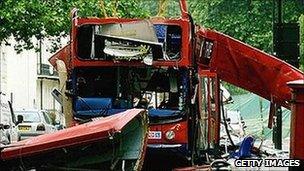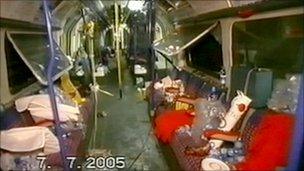7/7 inquests: Coroner to deliver London attack findings
- Published

Four suicide bombers killed 52 people and injured more than 700 in the attacks in London in 2005
The coroner at the inquests on the victims of the 7/7 London bombings is due to publish her findings.
Lady Justice Hallett will examine the work of the emergency and security services and is expected to formally record verdicts of unlawful killing.
Four suicide bombers killed 52 people and injured more than 700 on London's public transport system on 7 July 2005.
The inquests have heard 309 witnesses and a further 197 statements since they began in October last year.
Relatives' recommendations
The bombers targeted Tube trains at Aldgate, Edgware Road and Russell Square and a double decker bus in Tavistock Square.
The remit of the inquests at the Royal Courts of Justice in London included investigating the emergency services' response on the day and considering whether MI5 could have prevented the attacks.
The relatives of those who died said they want lessons to be learned and for their loss to contribute to the saving of lives of others in future.

The Tube bombing between King's Cross and Russell Square killed 26 passengers
The coroner will make a series of recommendations and the relatives have come up with a list of points they want her to cover in her ruling.
These include stricter controls on bomb-making ingredients and improved training for emergency workers. They also listed nine points concerning the alleged failures by MI5 and police.
The inquest heard the security services failed to show a colour surveillance photograph of two of the bombers to a supergrass before the attacks.
But a senior MI5 officer, referred to as Witness G, gave evidence to the inquests and defended the decisions that had been made.
Bravery highlighted
The evidence at the inquest revealed the confusion of the emergency services and transport controllers as the full extent of the situation emerged on 7 July 2005.
There was a shortage of vital equipment, and mobile phones and radios did not work underground, the inquest was told.
The coroner was told about a delay of nearly 30 minutes in getting firefighters into King's Cross station and that they waited, thinking there could be a chemical or biological attack below - despite the fact that travellers who had made their own way out of the station showed no such signs.
Lady Justice Hallett also heard about the bravery of individuals - both people on the trains and rescue workers - and the problems they had to overcome.
She decided the inquest should only cover the deaths of the 52 innocent victims of the attacks.
A separate inquest for the four bombers could still be held in the future and the coroner may make a ruling on this when she presents her findings.
- Published6 May 2011